rescue
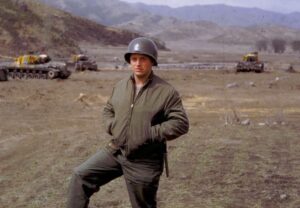 These days, our military men and women have a code…Leave No Man Behind. That was not always the case, or maybe it’s just not the case with all soldiers. On April 22, 1951, the Chinese Army launched the Spring Offensive against American forces during the Korean War. They sent 300,000 Chinese troops to attack the American lines. An influx of that magnitude would be overwhelming for any army. Within two days the American forces were being overwhelmed. A unit from the 8th Ranger Company (Airborne) was looking pretty grim on April 24, 1951. They had been ordered to move forward to gain intelligence on the Chinese. They quickly became surrounded by Chinese soldiers. It was turning into every soldier’s nightmare. It didn’t look like they were going to make it out of the Korean War alive. The men had not been captured yet, but they were stranded where they were. They radioed their situation, hoping for rescue, but no one was willing to help.
These days, our military men and women have a code…Leave No Man Behind. That was not always the case, or maybe it’s just not the case with all soldiers. On April 22, 1951, the Chinese Army launched the Spring Offensive against American forces during the Korean War. They sent 300,000 Chinese troops to attack the American lines. An influx of that magnitude would be overwhelming for any army. Within two days the American forces were being overwhelmed. A unit from the 8th Ranger Company (Airborne) was looking pretty grim on April 24, 1951. They had been ordered to move forward to gain intelligence on the Chinese. They quickly became surrounded by Chinese soldiers. It was turning into every soldier’s nightmare. It didn’t look like they were going to make it out of the Korean War alive. The men had not been captured yet, but they were stranded where they were. They radioed their situation, hoping for rescue, but no one was willing to help.
Captain James Herbert, the company commander, and his men (87 enlisted, three officers) were able to bypass a good portion of the advancing Chinese units, but eventually, became cut off from the US lines. Herbert called for artillery fire and air strikes against the approaching Chinese. To his shock, he was told to “get out as best you can” and left to figure out their escape on their own. Unfortunately, Herbert was seriously injured in the crossfire, receiving bullets in the throat, shoulder and arm. His throat was in bad shape, and he had to compress the holes on either side of his neck himself, because a tourniquet would have choked him to death. As a result of his injuries, he was no longer able to make the radio transmissions for help.
With Herbert seriously injured, acting communications chief Corporal Eugene Rivera took over, desperate to save the men. Rivera estimated that the Rangers had about 20 minutes before the Chinese reached their position. He immediately crawled his way to the top of a napalm-fried hill to reach a radio signal. While there, e had a great view of the surrounding area, and soon, with great relief, he saw what he called “the most beautiful sight of my life.” Lieutenant David Teich of Company C, 6th Tank Battalion heard the radio communications from the Rangers. He knew those men needed serious help, and immediate action was needed. Teich approached his captain to see if he and his fellow tankers could attempt a rescue mission, but was told, “We’ve got orders to move out. Screw them. Let them fight their own battles.” Stunned, Teich made the decision to disobey the orders of his captain. Teich, decided to stay and lead four tanks to rescue the Rangers who had been cut off by the Chinese forces. While Teich and the brave men who stayed with him made their way to the Rangers’ location, Teich’s captain and other US troops traveled south to safety.
Had it not been for Teich and his brave men, Rivera and his 65 men would have been doomed. There was no 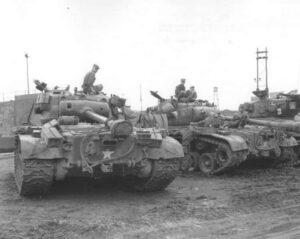 way for them to get out on their own. Teich and his men made their way to Rivera’s position on Hill 628 and retrieved the stranded Rangers. Herbert has since reflected on that day, saying, “Though we don’t always say it, Dave Teich saved our lives. If it wasn’t for him, we figure all of the survivors of the battle would have been killed or captured by the Chinese. We look upon Dave as our savior.” A total of 65 Rangers had survived and reached safety that day, because of Lieutenant David Teich. To this day, some of them still send letters of thanks to him, despite not knowing each other personally. As to the other men and their captain…well, as far as I am concerned, theirs was a despicable act of cowardice. They would have wanted others to come to their rescue, but they chose to run!! I’ll never see it differently.
way for them to get out on their own. Teich and his men made their way to Rivera’s position on Hill 628 and retrieved the stranded Rangers. Herbert has since reflected on that day, saying, “Though we don’t always say it, Dave Teich saved our lives. If it wasn’t for him, we figure all of the survivors of the battle would have been killed or captured by the Chinese. We look upon Dave as our savior.” A total of 65 Rangers had survived and reached safety that day, because of Lieutenant David Teich. To this day, some of them still send letters of thanks to him, despite not knowing each other personally. As to the other men and their captain…well, as far as I am concerned, theirs was a despicable act of cowardice. They would have wanted others to come to their rescue, but they chose to run!! I’ll never see it differently.
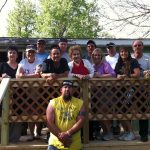
 My nephew Steve Spethman is a big, strong man. His shoulders have bailed us out of many a tough spot. When my mother, Collene Spencer was in her late-stage-life weakened-mobility state, we could always count on Steve to single-handedly lift her from an armless chair to a standing position so she could walk out of church using her walker. It would have taken two of us to do what Steve did alone. We were so grateful to Steve. He helped our mom maneuver with grace and dignity. When Steve lifted Mom from her chair, she was up on her feet before anyone around her really realized that she had been assisted. Steve made it so smooth for her, so that she never felt embarrassed. Steve gave her the gift of dignity, and we can never repay him for that.
My nephew Steve Spethman is a big, strong man. His shoulders have bailed us out of many a tough spot. When my mother, Collene Spencer was in her late-stage-life weakened-mobility state, we could always count on Steve to single-handedly lift her from an armless chair to a standing position so she could walk out of church using her walker. It would have taken two of us to do what Steve did alone. We were so grateful to Steve. He helped our mom maneuver with grace and dignity. When Steve lifted Mom from her chair, she was up on her feet before anyone around her really realized that she had been assisted. Steve made it so smooth for her, so that she never felt embarrassed. Steve gave her the gift of dignity, and we can never repay him for that.
Steve’s strength has come to our rescue in other ways too. When we wanted to build our mom a deck, Steve was among the people who helped. He and my brothers-in-law, Mike Reed, Mike Stevens, Chris Hadlock, my husband, Bob, and nephew, Garrett did the heavy work so that the deck could become a reality…one that my sisters and I wanted for our mom, but could not have accomplished on our own. I suppose women could do that job, but Steve and the guys carried the heavy load, and made it a much easier job. In fact, they did the deck, while my sisters and I did spring cleaning in the house. We will be forever grateful to these men for what they did for our parents over the years.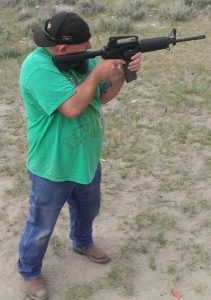
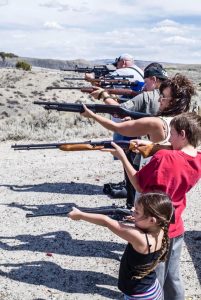
Steve is all about family. His children and his wife, my niece, Jenny are his priority. He and Jenny have taught them so much, including the especially important gun safety and usage. In these tumultuous times we all need to know how to protect ourselves. The Spethman family often goes out shooting, and even little Aleesia is learning to shoot. Her brothers, Xander, Zack, and Isaac have all taken and passed the hunter safety courses so they can go hunting with their dad. It is a rite of passage that the boys looked forward to very much, as I’m sure Aleesia will as well. Steve is a good dad who wants the best for his family, and works with each of them to ensure that for them. Today is Steve’s birthday. Happy birthday Steve!! Have a great day!! We love you!!
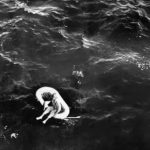 Arthur Duperrault dreamed of sailing the high seas. He was a World War II veteran from Green Bay, Wisconsin and he wanted to give his family a sailing adventure. The winter of 1960 was rough, but now the winter of 1961, would be one of sunlight and warmth. Arthur, Jean, Brian, Terry Jo, and Renee, were heading for the Bahamas to soak up some sun. Arthur and his family headed to Fort Lauderdale, Florida, where their boat, Bluebelle was waiting for them. It was a sixty foot two-masted sailboat.
Arthur Duperrault dreamed of sailing the high seas. He was a World War II veteran from Green Bay, Wisconsin and he wanted to give his family a sailing adventure. The winter of 1960 was rough, but now the winter of 1961, would be one of sunlight and warmth. Arthur, Jean, Brian, Terry Jo, and Renee, were heading for the Bahamas to soak up some sun. Arthur and his family headed to Fort Lauderdale, Florida, where their boat, Bluebelle was waiting for them. It was a sixty foot two-masted sailboat.
With no real sailing experience, Arthur hired a man named Julian Harvey, who was a decorated Air Force bomber pilot who had served in World War II and the Korean War, to captain for him. Harvey brought along his wife of four months, Mary Dene. On Wednesday, November 8, 1961, Arthur, Julian, and their respective families began their journey. Soon, the occupants of Bluebelle would be in the Bahamas. First, Harvey steered Bluebelle toward Bimini, a miniature island chain. Then headed east, to Sandy Point, a village located on the southwest point of the Great Abaco Island. Here, the vacationers filled their days with snorkeling and picking up shells on the beautiful beaches.
On Sunday, November 12, 1961, Arthur and Julian went to the office of Roderick Pinder, who was Sandy Point’s commissioner, to fill out the forms that they needed to properly leave the Bahamas. Arthur told Roderick. “We’ll be back before Christmas.” Little did Arthur, his wife, or three children know, they would not be coming back for Christmas. Sunday would be Arthur’s last night alive. It would also be last night alive for Jean, Brian, Renee, and Julian Harvey’s wife, Mary Dene. Sunday dinner was cooked by Mary Dene, who made a chicken cacciatore and salad for the two families. At 9:00 pm that night, Terry Jo went to bed. Her room was in a small cabin in the back of the boat. Usually, Renee, her young sister, slept there too, but tonight, she was with her mom, dad, and brother in the cockpit. In the middle of the night, Terry Jo heard her brother scream, “Help, daddy, help!” The screams were followed by running and stamping noises. Terry Jo was terrified. After the running, the stamping, and the screams stopped, there was an eerie silence.
Terry Jo was terrified, but found the courage to leave her cabin. The main cabin, a kitchen and dining room during the day, transformed into a bedroom at night. There she saw her mom and big brother, in a pool of blood…dead. Cautiously, she went to check the other areas of the boat. Near the cockpit, she saw more blood and a knife. She made her way to the front of the boat. As Terry Jo was viewing the horror in front of her, somebody lunged at her. It wasn’t a stranger…it was the captain, Julian Harvey. “Get back down there!” he 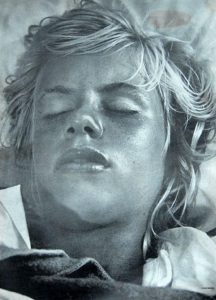 screamed. With her heart pounding, Terry Jo went back to her cabin. She crawled into her bunk. Soon, water coming into the cabin told her that Bluebelle was sinking. She was too afraid to move. However, Harvey was moving all over the place. Soon, she saw Harvey in the doorway holding her big brother’s rifle. Then Harvey turned and walked out of the cabin, and she heard him climb the stairs back to the upper deck.
screamed. With her heart pounding, Terry Jo went back to her cabin. She crawled into her bunk. Soon, water coming into the cabin told her that Bluebelle was sinking. She was too afraid to move. However, Harvey was moving all over the place. Soon, she saw Harvey in the doorway holding her big brother’s rifle. Then Harvey turned and walked out of the cabin, and she heard him climb the stairs back to the upper deck.
With water reaching the top of her mattress, Terry Jo knew she had to get out. Wading through the water, she climbed to the deck again. On deck she saw that the ship’s dinghy and rubber life raft were floating beside the boat. “Is the ship sinking?” she called out. “Yes!” Harvey shouted, coming up from behind her. He pushed the line to the dinghy into her hands. “Hold this!” he shouted. Numb from shock, Terry Jo let the line slip through her fingers. The dinghy slowly drifted away from the sinking Bluebelle. Harvey jumped overboard to catch it, and Terry Jo watched him swim after the dinghy and disappear into the night. She remembered the cork life float that was kept lashed to the top right side of the main cabin, which was now just barely above-water. She scrambled to the small, oblong float and quickly untied it. Just as the float came free, the boat deck sank beneath her feet. She pushed the float into the open water, and climbed onto the float. One of its lines snagged on the sinking ship. For a moment, she and the float were pulled underwater as the Bluebelle went down. Then the line came free, and they popped back to the surface. She huddled low on the float, afraid that the captain might be coming back. She had no water, no food, and nothing to protect her from the cold. The night was so dark that she couldn’t see anything.
For three days Terry Jo was battered by the salt water, and scorched by the sun…her only companions, a pod of porpoises. She had no food or water. Each day brought her closer to death. On Tuesday, a small red plane circled overhead. She waved at it for a long time with her blouse. The plane passed directly over her, but at an angle that made it impossible for the pilots to see her. When the sun rose on Thursday, she did not feel its burning rays. She was in a deep sleep close to death. Only the faintest spark of life was left. About midmorning she emerged from her stupor and opened her eyes. A huge shadow loomed above her like a great beast. Its rumble was so deep that she could feel its pounding rhythm in her chest. It seemed like a dream, until she looked up to the top of that great wall, and saw heads and waving arms. She could hear voices shouting. Finally, she felt herself lifted from the water. She passed out again. Terry Jo spent 11 days in a Miami hospital but had no permanent injuries
The day after the Bluebelle went down, an oil tanker spotted Harvey. When the captain pulled the tanker closer, he yelled, “My name is Julian Harvey. I am master of the Bluebelle.” In the days that followed, Harvey told the Coast Guard in Miami that he was the sole survivor of a grave accident. In the middle of the previous night, he said that a sudden squall damaged the sailboat. His wife, Mary Dene, and the Duperraults were injured when the masts and rigging collapsed. Gas lines in the engine room ruptured, and the ship caught fire as it sank. Harvey said he had managed to get in the dinghy, but tangled rigging trapped everyone else on board. A few days later, staying at the Sandman Hotel, Harvey heard that Terry Jo had survived. The next day, a maid at the hotel found Harvey’s bloody, lifeless body on the floor. He had killed himself.

A week after her rescue, officials questioned Terry Jo in her hospital bed. Her story, disproved Harvey’s account. Her father, mother, brother, and younger sister, along with Mary Dene Harvey, had been slaughtered aboard the Bluebelle, at the hands of Julian Harvey. The police suspect that Harvey killed his wife to collect money from her life insurance, and one theory suggests that Duperrault caught Harvey in the act, prompting the other murders. Terry Jo returned to Green Bay to live with her father’s sister and three cousins. When she was 12, she changed her name to Tere. Nearly 50 years later, in 2010, Tere finally revealed the details of the night her family was killed and her days spent drifting in open water in her book, Alone: Orphaned on the Ocean.
 A couple of weeks ago, a baby bird fell out of it’s nest into our front yard. Our neighbor Mary Sanchez saw it first, and was careful not to disturb it when she mowed her lawn. The next day, when Bob and I came home and parked out front, we heard a commotion. I walked toward the hedge that separates our yard from Mary’s, and was surprised to see a squawking baby crow standing in the grass. It’s mom was nearby, warning me to stay away from her baby, so we backed away and left the situation alone. We weren’t sure if the mom was taking care of her baby, or what, so we watched closely. Very soon, there was no doubt that she was a good mom, and in fact there was also a good dad in this situation. A few days went by, and while we worried about cats, this little baby bird continued to thrive…miraculously.
A couple of weeks ago, a baby bird fell out of it’s nest into our front yard. Our neighbor Mary Sanchez saw it first, and was careful not to disturb it when she mowed her lawn. The next day, when Bob and I came home and parked out front, we heard a commotion. I walked toward the hedge that separates our yard from Mary’s, and was surprised to see a squawking baby crow standing in the grass. It’s mom was nearby, warning me to stay away from her baby, so we backed away and left the situation alone. We weren’t sure if the mom was taking care of her baby, or what, so we watched closely. Very soon, there was no doubt that she was a good mom, and in fact there was also a good dad in this situation. A few days went by, and while we worried about cats, this little baby bird continued to thrive…miraculously.
The day did come when we were forced to intervene. Our little baby bird decided to go and stand in the middle of the street…and it was a hot day. We debated on what to do about this situation, and determined that if we 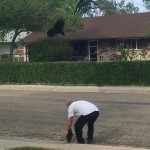 didn’t move it, a car was going to hit it, or the hot asphalt would kill it. So my brave husband donned a pair of gloves, picked the bird up, and moved it back toward our back yard…dodging the dive bomb attempts of the mother. All we could do then was stay away and hope the parents continued their great care of their baby. The baby continued to get bigger, and the parents were always around, so we decided that our bird rescue had been successful.
didn’t move it, a car was going to hit it, or the hot asphalt would kill it. So my brave husband donned a pair of gloves, picked the bird up, and moved it back toward our back yard…dodging the dive bomb attempts of the mother. All we could do then was stay away and hope the parents continued their great care of their baby. The baby continued to get bigger, and the parents were always around, so we decided that our bird rescue had been successful.
Of course, like all children, the day came when our little bird again decided to go into the street, and so began bird rescue take 2. Once again dodging the dive bombs of the mom, Bob picked up the bird and put it back near our back fence. That turned out to be to best plan, because the bird decided to check out the back yard, and we began to worry less. The baby has stayed in the back yard, and out of trouble for the most part. We had to chase off a cat twice, and now the parents are a little bit more tolerant of us…at least when the cat 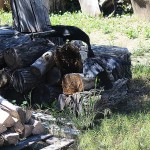 shows up. In fact, I think she likes us then.
shows up. In fact, I think she likes us then.
I have had the opportunity to get some great close up photos of the baby, and finally today, I was treated to the chance to observe lunchtime. Flying lessons have begun, but this is a big baby, and it’s wings aren’t long enough yet. Nevertheless, it’s parents know that it needs to build up its muscles so that when its wings catch up with its body, it will be able to fly. This has been a wonderful things to watch, and while we know that our little baby is still not out of danger, we have high hopes for it. One thing I can say for sure, this job of raising baby at 60+ years old is a lot to take on. I know now, why we all have kids when we are young.
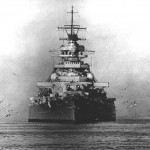 After I wrote the story about the sinking of the Bismarck, my nephew, Steve Spethman told me about a documentary he had about the man who located the Bismarck, and the search for it. Of course, I jumped at the chance to watch it, but when I was done watching it, I felt…different. It’s easy to be excited about a victory in a battle in wartime, or in a war that your dad fought in. It’s easy to set aside the thoughts of lives lost in historic battles, when you know that the battle had to be fought, and the victory would determine the course of the world stage. The problem with that thinking though, is that all too often…especially in countries governed by an evil dictator, such as Adolf Hitler, the people involved in the war, have no choice as to whether or not to fight. I know that a draft is sometimes necessary, but I would much rather have a military machine composed of volunteers than one from a draft. I think volunteers know what they are walking into. It is a cause they agree with, not one they were forced to accept.
After I wrote the story about the sinking of the Bismarck, my nephew, Steve Spethman told me about a documentary he had about the man who located the Bismarck, and the search for it. Of course, I jumped at the chance to watch it, but when I was done watching it, I felt…different. It’s easy to be excited about a victory in a battle in wartime, or in a war that your dad fought in. It’s easy to set aside the thoughts of lives lost in historic battles, when you know that the battle had to be fought, and the victory would determine the course of the world stage. The problem with that thinking though, is that all too often…especially in countries governed by an evil dictator, such as Adolf Hitler, the people involved in the war, have no choice as to whether or not to fight. I know that a draft is sometimes necessary, but I would much rather have a military machine composed of volunteers than one from a draft. I think volunteers know what they are walking into. It is a cause they agree with, not one they were forced to accept.
The movie about the Bismarck’s location, while mostly about the location of a sunken ship, was very different  from the documentaries I had seen about other ships, like the Titanic. While both ships were located by the same man, Robert Ballard, the feelings taken away from the Bismarck, both for Ballard and for the audience were quite different. The addition of commentary from some of the actual survivors of the Bismarck, as well as men on the ships who went in for the final sinking and the rescue of survivors, was very sobering. I was very moved by the German men who remembered the name of the man, Joe Brooks, who risked his own life to try to pull them from the water. They said, in fact, that his name was revered among German soldiers everywhere. This was a man who, in a war situation, chose to do good to his enemies…an almost unheard of act in wartime, but that act from the middle of a war, is still remembered 74 years later.
from the documentaries I had seen about other ships, like the Titanic. While both ships were located by the same man, Robert Ballard, the feelings taken away from the Bismarck, both for Ballard and for the audience were quite different. The addition of commentary from some of the actual survivors of the Bismarck, as well as men on the ships who went in for the final sinking and the rescue of survivors, was very sobering. I was very moved by the German men who remembered the name of the man, Joe Brooks, who risked his own life to try to pull them from the water. They said, in fact, that his name was revered among German soldiers everywhere. This was a man who, in a war situation, chose to do good to his enemies…an almost unheard of act in wartime, but that act from the middle of a war, is still remembered 74 years later.
So seldom, when talking about a war, do you hear about both sides of the war. While you may hear about 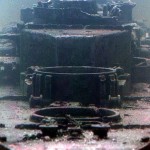 their goals and reasons for going to war, you don’t hear about the human factor of each side. I think that was the thing that made me feel so different…almost somber after the movie. One man said that in a sea battle, you usually never see the enemy. He saw men…just briefly as they were running across the deck of the Bismarck. That was it…until they were in the water beside his ship. Then they weren’t soldiers, but real people in dire straits, who were about to lose their lives. In the end, Robert Ballard stood alone at the back of the ship he was on when he found the Bismarck, and I could tell that he felt the same way as I did. The war and the battle had both been a necessary action on the part of the allies, because evil cannot be allowed to prevail, but that simply does not change the fact that these were real lives and real tragic situations.
their goals and reasons for going to war, you don’t hear about the human factor of each side. I think that was the thing that made me feel so different…almost somber after the movie. One man said that in a sea battle, you usually never see the enemy. He saw men…just briefly as they were running across the deck of the Bismarck. That was it…until they were in the water beside his ship. Then they weren’t soldiers, but real people in dire straits, who were about to lose their lives. In the end, Robert Ballard stood alone at the back of the ship he was on when he found the Bismarck, and I could tell that he felt the same way as I did. The war and the battle had both been a necessary action on the part of the allies, because evil cannot be allowed to prevail, but that simply does not change the fact that these were real lives and real tragic situations.
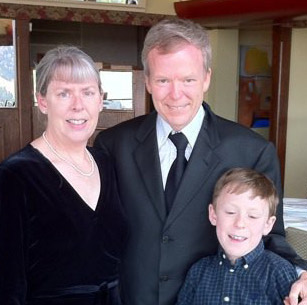 I have been intently watching the flooding this past week in Colorado, and especially Boulder, which is very near where my cousin Tim and his family live. Rain has poured into the state, and the flooding rivals the July 31, 1976 Big Thompson flood in many areas. In that flood, 12 to 14 inches of rain fell in 4 hours, flooding the canyon…144 people lost their lives, and 150 were injured. So far in this flood, only 4 people have died, thankfully, and hopefully that will be all, but only time will tell. Roads have been washed out, and I-25 is under water in some areas, causing it’s closure along with the closure of many other roads. Neighbors have stepped up to help save the homes of other people, some of whom they don’t even know, and often working for hours without even being asked. It has been a real show of the human spirit and its ability to care for those in need. Outside help is probably scarce, because no one can get there, leaving them somewhat isolated, except for helicopters that have been able to come in from other areas. Schools are closed, and many people have been told not to attempt to go to work. Two people were
I have been intently watching the flooding this past week in Colorado, and especially Boulder, which is very near where my cousin Tim and his family live. Rain has poured into the state, and the flooding rivals the July 31, 1976 Big Thompson flood in many areas. In that flood, 12 to 14 inches of rain fell in 4 hours, flooding the canyon…144 people lost their lives, and 150 were injured. So far in this flood, only 4 people have died, thankfully, and hopefully that will be all, but only time will tell. Roads have been washed out, and I-25 is under water in some areas, causing it’s closure along with the closure of many other roads. Neighbors have stepped up to help save the homes of other people, some of whom they don’t even know, and often working for hours without even being asked. It has been a real show of the human spirit and its ability to care for those in need. Outside help is probably scarce, because no one can get there, leaving them somewhat isolated, except for helicopters that have been able to come in from other areas. Schools are closed, and many people have been told not to attempt to go to work. Two people were 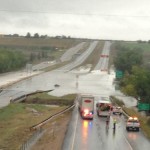 stranded in the mountains in whiteout conditions, because
stranded in the mountains in whiteout conditions, because 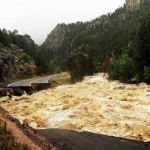 rescue resources were limited. They were rescued after 48 hours in the storm. Tim told me that the barrel they have in their back yard, to measure the rain, shows 10 inches over 3 days, with most of it coming over a 12 hour period. The huge snow storm in the mountains could cause continuing problems if it begins to melt.
rescue resources were limited. They were rescued after 48 hours in the storm. Tim told me that the barrel they have in their back yard, to measure the rain, shows 10 inches over 3 days, with most of it coming over a 12 hour period. The huge snow storm in the mountains could cause continuing problems if it begins to melt.
This flood also reminded me of an old photograph in my grandmother’s album. I’m not sure where this taken, but it does appear that they had quite a bit of water. Sadly, in those days, homes weren’t sealed as well, and so I’m sure there was extensive damage. Add to that, the fact that they didn’t have some of the clean up tools and chemicals to prevent mold, and you have a recipe for a big mess. They also didn’t have warning systems to tell them of the possiblity of a flash flood, and there were may people who lost their lives in 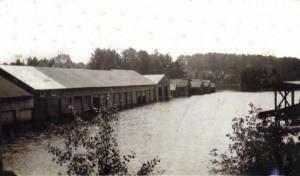 those situations. The things that have not changed over the years are the incredible human spirit and peoples’ will to survive. Neighbors will continue to help their neighbors, and people will fight to survive and rebuild their lives after each new disaster hits them. Floods are one of the most dangerous situations people can be in, and I am thankful that we have resources today to help more and more of them survive that danger. I will continue to pray for all those people who’s lives have been touched by the 2013 Colorado floods.
those situations. The things that have not changed over the years are the incredible human spirit and peoples’ will to survive. Neighbors will continue to help their neighbors, and people will fight to survive and rebuild their lives after each new disaster hits them. Floods are one of the most dangerous situations people can be in, and I am thankful that we have resources today to help more and more of them survive that danger. I will continue to pray for all those people who’s lives have been touched by the 2013 Colorado floods.
 As we all know, today is the 11th anniversary of the worst terrorist attack in United States history. September 11, 2001 was as horrible as it gets, but while it was designed to destroy us, the terrorists did not understand the strength of this country and it’s people. The people of this nation are survivors. When we are attacked, we fight back. We do not give up. The attacks resulted in the deaths of 2977 innocent victims, and 19 hijackers…who I like to think of as executed. These misguided men thought they were doing something great, but they had a rude awakening when they hit eternity. The fires from the planes were nothing compared to the fires of hell.
As we all know, today is the 11th anniversary of the worst terrorist attack in United States history. September 11, 2001 was as horrible as it gets, but while it was designed to destroy us, the terrorists did not understand the strength of this country and it’s people. The people of this nation are survivors. When we are attacked, we fight back. We do not give up. The attacks resulted in the deaths of 2977 innocent victims, and 19 hijackers…who I like to think of as executed. These misguided men thought they were doing something great, but they had a rude awakening when they hit eternity. The fires from the planes were nothing compared to the fires of hell.
What followed the attacks was some of the greatest displays of heroics known to mankind. Rescue workers, from police, firemen, and port authority, to ordinary people sprang into action. They were the ones not running from the building, they were running into the building, or staying in the building instead of running to escape. These people valued the life of others over and above their own…knowing that their actions would most likely bring their own death. What kind of person is so selfless? Their actions went so against the normal reaction to this kind of situation. Normally your reaction is to save yourself…run…survive, but not these people. They chose to save others…to go into the buildings…to rescue, to sacrifice themselves so that others would survive. That is the greatest gift, as the Bible says in John 15:13, “Greater love hath no man than this, that a man lay down his life for his friends.” And many of these people didn’t even know the people that they were laying down their lives for. In the face of hate, these heroes loved their fellow man, and did everything in their power to save them.
Everyday, rescue workers and ordinary people make the choice to put others ahead of themselves. Sometimes it is life threatening situations, and sometimes it is saving structures and forests, but the actions are the same. Without regard for their 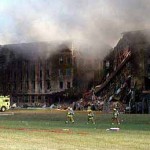 own lives these heroes rush in to save. Today, we remember all those who were lost in the horrible attacks of September 11, 2001, rescue workers and innocent victims alike. It doesn’t matter how their lives were lost. What matters is that their lives were precious and taken from them far too soon. What matters is that they stood bravely in the face of hate, and showed the world that love wins in the end. Those people, those innocent victims and rescue workers deserve to be remembered forever. Their attackers don’t. They chose their fate. They embodied the face of hate that brought out the love…the very best in the people of this country. In the face of hate, our people showed love to one another. There is no greater love on this earth.
own lives these heroes rush in to save. Today, we remember all those who were lost in the horrible attacks of September 11, 2001, rescue workers and innocent victims alike. It doesn’t matter how their lives were lost. What matters is that their lives were precious and taken from them far too soon. What matters is that they stood bravely in the face of hate, and showed the world that love wins in the end. Those people, those innocent victims and rescue workers deserve to be remembered forever. Their attackers don’t. They chose their fate. They embodied the face of hate that brought out the love…the very best in the people of this country. In the face of hate, our people showed love to one another. There is no greater love on this earth.
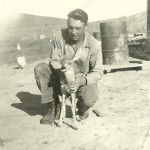 Once in a while, you get the chance to rescue a wild animal, and in an even more rare situation, you might get the chance to raise that animal, usually a baby who has lost its mother, and really has no way to survive on its own. That situation came about for my father-in-law back in about 1946, when a baby deer found its way not only into his care…not only into his heart, but into the family.
Once in a while, you get the chance to rescue a wild animal, and in an even more rare situation, you might get the chance to raise that animal, usually a baby who has lost its mother, and really has no way to survive on its own. That situation came about for my father-in-law back in about 1946, when a baby deer found its way not only into his care…not only into his heart, but into the family.
My father-in-law has always had a soft heart, and when he found this baby, whose mom was dead, and who was in a lot of trouble out there all by himself…well, he took him in and raised him. The deer settled right in and became part of the family. He revelled in the attention he got from everyone. I suppose the deer thought that my father-in-law was his parent, I mean, what else did he know, except that this person fed him and took care of him…just like a parent would do.
The deer was a part of the family for 2 years, during which time he was included in pictures with the family, and was even photographed by himself, sitting on the hood of a tractor. No he didn’t get there my himself. My father-in-law lifted him up there for the picture, but 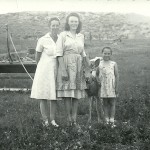 the deer didn’t see anything wrong with such a thing. He had become so much a part of the family, that he figured that was right where he should be.
the deer didn’t see anything wrong with such a thing. He had become so much a part of the family, that he figured that was right where he should be.
The deer shared in their lives for 2 years before they decided that he was ready to be released back into the wild, and once they let him go, they never saw him again. My father-in-law figures that he was probably shot by a hunter, but while I am not against hunting, I have to hope that this little darling somehow got lucky and didn’t end up on someone’s table somewhere. He is just too cute and too sweet to think that he was hunted, killed and eaten. Just my opinion.

